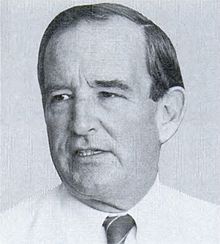Stewart McKinney (politician)
| Stewart McKinney | |
|---|---|
 |
|
| Member of the U.S. House of Representatives from Connecticut's 4th district |
|
|
In office January 3, 1971 – May 7, 1987 |
|
| Preceded by | Lowell P. Weicker, Jr. |
| Succeeded by | Christopher Shays |
| Member of the Connecticut House of Representatives | |
|
In office 1967–1971 |
|
| Personal details | |
| Born |
January 30, 1931 Pittsburgh, Pennsylvania |
| Died | May 7, 1987 (aged 56) Washington, D.C. |
| Political party | Republican |
| Spouse(s) | Lucie Cunningham |
| Children | John P. McKinney |
| Alma mater | Yale University |
Stewart Brett McKinney (January 30, 1931 – May 7, 1987) was an American politician who represented the Fourth congressional district of Connecticut in the House of Representatives from 1971 until his death from AIDS in Washington, D.C. in 1987.
McKinney was born in Pittsburgh, Pennsylvania and raised in Connecticut. He attended Kent School and later Princeton University from 1949 to 1951, but dropped out and enlisted in the United States Air Force. He attained the rank of sergeant, and completed his enlistment in 1955. McKinney then returned to college, and received a B.A. from Yale University in 1958.
He raced cars and was involved in several car-related businesses, including Auto Interior Decorators, Inc. and Fairfield Firestone, and was President of a chain of tire stores called CMF Tires. He also owned Lantern Point Real Estate Development and other ventures.
In 1966, McKinney was elected as a Republican to the Connecticut State House of Representatives, where he served two 2-year terms, 1967-1971. He was Minority Leader in his second term.
In 1970, McKinney ran for the U.S. House and won. He served in the House as a moderate Republican until his death in Washington, DC. He is widely known for the McKinney-Vento Homeless Assistance Act of 1986, which provides federal money for shelter programs. McKinney served on the Banking, Finance and Urban Affairs Committee and is credited with coining the phrase "too big to fail" in connection with large banks. In Congress, he served on the House Select Committee on Assassinations. During this time, he also served as a director of Bridgeport Hospital.
...
Wikipedia
